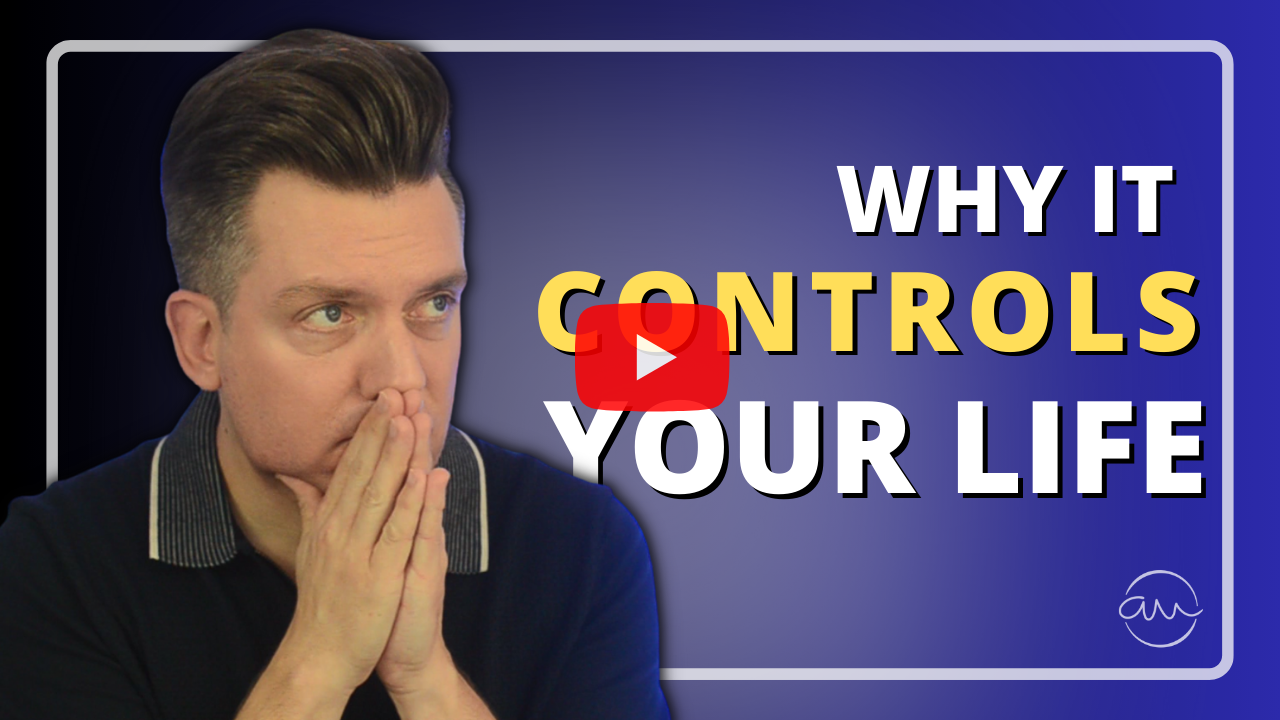Do you ever feel anxious at the mere thought of having to go out or attend a social event, do you worry that you might become the centre of attention? Do you sometimes worry that people might notice something about you or the way you act, or are you concerned the people you're with might judge you? If you do, these are common signs of social anxiety. These feelings are different to just feeling shy or nervous - it's a powerful fear that affects your personal and professional life and is often misunderstood by others who don't experience it.
So, in this article, we're going to discuss six common signs of social anxiety to help you can spot the warning signs and importantly you'll learn three 3 steps you can take to start beating social anxiety gradually. So, let's start by understanding exactly what social anxiety is, how is it defined?
What is Social Anxiety?
Social anxiety is characterised by a marked fear or anxiety about one or more social situations in which you're being exposed to possible scrutiny by other people. So, if you're suffering with social anxiety, you often anticipate negative evaluation, criticism, or rejection by others.
Social situations almost always provoke fear or anxiety which means you avoid social situations or you have to endure them with great difficulty and your fears or anxiety is out of the portion of dangers being posed by the situation. This leads to more and more avoidance of social interactions, like avoiding parties or public speaking events to avoiding everyday activities like eating in public or even making phone calls.
Social anxiety impacts you professional and personally influencing the way you feel and behave, but the good news is, change is possible, and you can overcome social anxiety gradually. First, let's take a closer look at six common signs of social anxiety so you can spot the warning signs:
Watch my video, 6 Signs Of Social Anxiety (And What To Start Doing About It)
Learn more more about what social anxiety, (or social phobia) is, and how the symptoms control your life.
What are the most common signs and symptoms of social anxiety?
Social anxiety is a complex and multifaceted mental health condition, extending beyond mere shyness. There is often a delicate interplay of physical, emotional, and cognitive elements, so everyone that experiences social anxiety will have a highly individualised experience, with varying symptoms and triggers, but here are six common signs and symptoms which are often experienced by my clients dealing with social anxiety:
Six Common Signs Of Social Anxiety:
1. You Feel Very Self Conscious and Judged
Social anxiety can leave you feeling fearful of being judged and criticised by others. You might feel like there's a constant spotlight shining on you, making you self-conscious and afraid of making mistakes. It means the fear controls you and holds you back from feeling able to express yourself authentically and really participating fully in social situations.
These fears of being judged and criticised can mean your brain goes into overdrive, activating the amygdala and triggering your stress response, making you more sensitive to these 'perceived' threats in social situations. So, it amplifies your anxiety, and which can lead to an overwhelming desire to remove yourself from the situation or avoid things all together to escape the discomfort.
2. You Are Overwhelmed and Fearful of Being In Social Situations
It's not surprising that one of the most common signs of social anxiety is an overwhelming fear of social situations like social gatherings, parties, or even everyday interactions - it might even be a meeting with your manager. You just find yourself feeling anxious or nervous in anticipation of it actually happening - like a knot in your stomach that tightens as the situation approaches, leaving you dreading the thought of facing people or having to engage in conversations.
When this happens, your mind might flood with worries about being judged, saying the wrong thing, or embarrassing yourself. So, this fear can lead to avoidance behaviours, where you start skipping events or finding excuses to stay home. You might even decide to isolate yourself from social interactions altogether, choosing to retreat to the comfort and safety of your own space. Of course, while it may provide temporary relief, it means long term, you're preventing yourself from building connections, experiencing new things, and enjoying life.
3. You Feel Constantly Worried About Your Social Performance
Social anxiety often means you have persistent worried about your social performance. You may find yourself constantly preoccupied with thoughts about saying the wrong thing, behaving awkwardly, or being judged by others. This excessive worry can create a cycle of anxiety, making it difficult to fully engage in social interactions and enjoy the present moment.
You end up analysing every word and action, searching for potential mistakes or embarrassing moments. And this hyperfocus on your performance magnifies your anxiety, leading to self-doubt and an ongoing fear of being scrutinised! So, it's no wonder it impacts your confidence, self-esteem, and overall well-being as a result.
4. You Find it Difficult to Initiate or Maintain Conversations
The thought of having to start or even maintain a conversation can be overwhelming. That worry in itself, can leave you feeling tongue-tied, unsure of what to say, or struggling to keep a conversation going as you overthink what to say next.
These thoughts, raise your stress response, and the fear of saying something wrong or being perceived as boring can cause your mind to go blank and your heart to race, making it challenging to express yourself and engage in anything meaningful. You might notice, physical symptoms too like increased heart rate, sweating, or a lump in the throat.
5. You Have a Negative Self-Image and Criticise Yourself
Social anxiety often accompanies negative self-image and self-criticism. You may constantly judge yourself harshly, magnify perceived flaws, and compare yourself unfavourably to others. This negative self-perception can significantly impact your self-esteem, confidence, and overall well-being.
In the brain, negative self-image and self-criticism activate the amygdala and the prefrontal cortex. The amygdala triggers the fear response, amplifying feelings of self-doubt and anxiety. The prefrontal cortex, responsible for self-reflection and evaluation, becomes hyperactive, fuelling self-critical thoughts and reinforcing negative beliefs about oneself.
6. You Worry Others Will Notice Your Nervousness or Anxiety
This is a common and distressing experience associated with social anxiety. you might feel hyper-focused on how you appear to others during social situations - you might become acutely aware of physical symptoms like blushing, sweating, or trembling, which you believe will be glaringly obvious to others. And this fear stems from a deep concern about negative evaluation and the potential for embarrassment or judgment. The worry intensifies as they imagine that others are closely scrutinizing their every move, leading to feelings of inadequacy and a strong desire to avoid social situations altogether.
This constant fear can be crippling, affecting various aspects of life. The fear of being perceived as weak or socially inept can undermine their self-esteem, leading to a negative cycle of self-criticism and increased anxiety.
Are there self-help strategies that can help alleviate social anxiety symptoms?
If you recognise the common signs of social anxiety, there are certain things that you can start doing that can help you overcome social anxiety gradually. It can be a challenging process, but taking small steps can lead to significant progress. So, here are four steps you can take that will help you overcome social anxiety gradually:
Step 1: Reduce the impact of stress and anxiety
Some helpful strategies include practicing relaxation techniques like deep breathing, progressive muscle relaxation, or mindfulness meditation. Engaging in regular physical exercise can also be beneficial, as it releases endorphins and helps reduce overall stress levels. Of course, getting enough sleep, maintaining a balanced diet, and avoiding excessive caffeine or stimulants can contribute to a more stable mood and improved ability to cope with anxiety. Additionally, seeking social support from understanding friends or family members can provide a valuable safety net as you work on overcoming social anxiety.
Step 2: Notice Self-talk and challenge negative thought patterns
Becoming aware of these internal dialogues is a crucial step in overcoming social anxiety. Pay attention to the thoughts that run through your mind when you anticipate social situations or during the events themselves. Instead of hearing that voice, tell yourself I like myself I like myself - and that really helps shift your perspective and raise your self-esteem.
Step 3: Gradual exposure to social situations
Allow yourself to experience the anxiety while staying in the situation until the discomfort decreases. As you become more comfortable, gradually progress to more challenging situations. The process of gradual exposure helps build confidence and demonstrates that anxiety lessens over time, leading to a reduction in fear and avoidance behaviours.
Start with the small things - expose yourself to things gradually and build your courage and strength. For example, just having that goal to say hello to one person you do not know sometime during the day and making eye contact is a fantastic first step. The point here is you start with something only mildly fearful and once you feel comfortable, you'll feel able to move on the next challenge. And as you do, your brain begins to use this positive experience to help you build your confidence.
Step 4: When to consider professional support
If you feel like your social anxiety is significantly interfering with your quality of life, it's probably a good idea to seek out support from a professional therapist, hypnotherapist or CBT practitioner who can work with you on your specific fears and comfort levels, to ensure that they are gradual and achievable.
In my online therapy practice, I help clients overcome their social anxiety using a combination of solution focused talk therapy with hypnosis. The process helps you reduce anxiety and fears whilst helping you gain perspective, increase your self-confidence and build resilience helping you to move forward towards your goals gradually.
How does hypnotherapy work for social anxiety?
Hypnotherapy works for social anxiety by combining positive talking therapy with hypnosis. During the first half of the session, we talk and focus on your strengths, skills find positive steps or solutions that helps you feel more confident to challenge yourself gradually. You're encouraged to think and express yourself in a positive way which helps you to reduce your anxiety too. We'll also explore in a simple way how to use the brain more positively at each stage which helps create healthier habits of though and behaviour that supports the changes you desire.
During hypnosis, we begin with guided relaxation techniques to calm your body and mind. And as you listen, you will be guided into a relaxed state of focused attention. Positive suggestions are then made to help you think differently and encourage changes subconsciously that help you overcome your challenges. If you're willing to make changes, hypnotherapy can set you free so you can enjoy life more and more.
How do I start online hypnotherapy for social anxiety?
If you'd like to explore how hypnotherapy could help you without obligation, please get in touch for a free initial chat with Andrew to explore your situation and discover what your personalised hypnotherapy program might look like.








